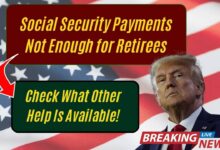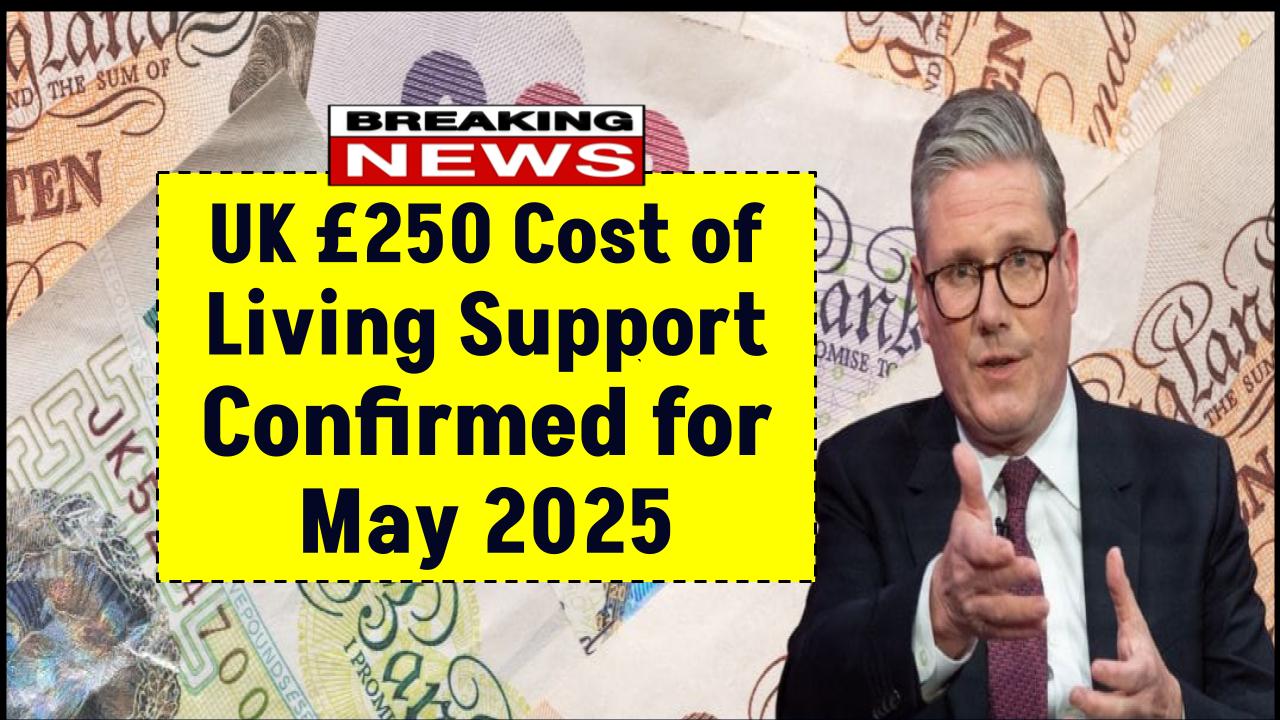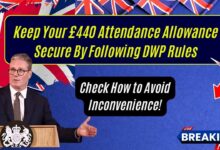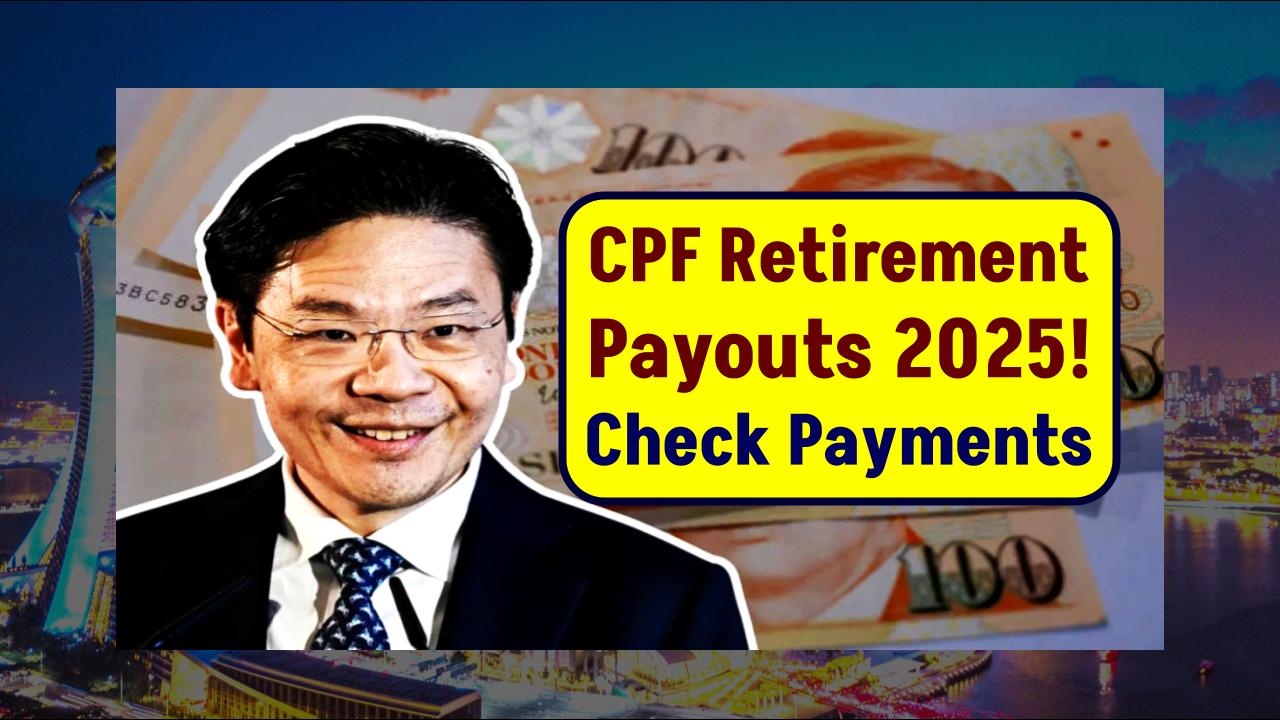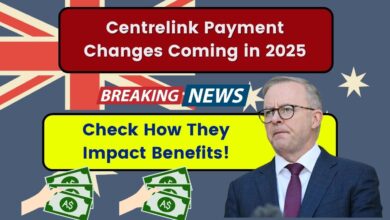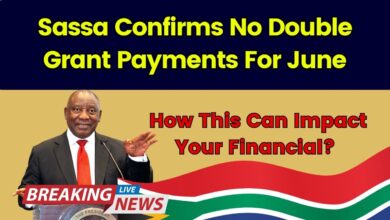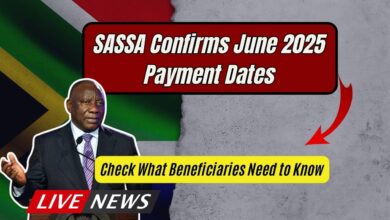Cost of Living Payment Drops This May from DWP – Check Your Deposit Date, Status, and Eligibility Now!
Cost of Living Payment Drops This May from DWP – If you’ve been keeping an eye on your bank account this year, you might’ve noticed that the Cost of Living Payment from the UK’s Department for Work and Pensions (DWP) has stopped landing in your balance this May. That’s right — the Cost of Living Payment drops this May, marking the end of an important relief program designed to help folks manage those ever-climbing bills. But don’t sweat it just yet. There are still ways to get support, and knowing exactly when you got paid, who qualified, and what help’s out there can make a world of difference.
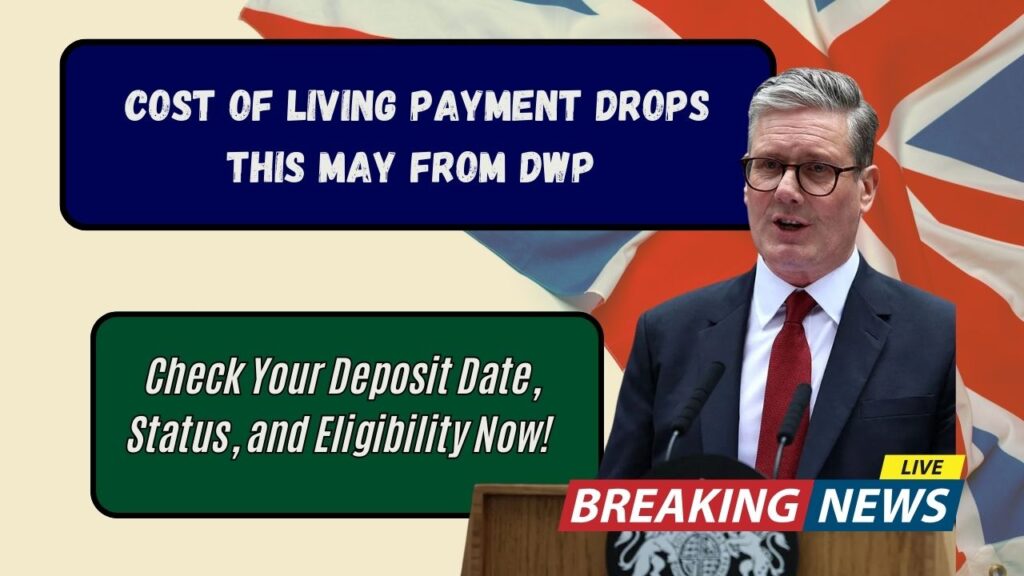
Let’s break it down, keep it real, and walk through everything you need to know about this drop — with no confusing jargon, just straight-up facts and advice you can actually use.
Cost of Living Payment Drops This May from DWP
| Topic | Details |
|---|---|
| Payment Ending Date | Cost of Living Payment drops this May 2025 |
| Who Received It | Low-income households on qualifying benefits (Universal Credit, Pension Credit, etc.) |
| Amount Paid | Up to £300 per eligible individual |
| No New Payments | DWP confirmed no further Cost of Living Payments for 2025 |
| Alternative Support | Household Support Fund (HSF) available till March 31, 2026; Energy grants from major suppliers |
| Official Resource | Gov.uk Cost of Living Payment |
The Cost of Living Payment drops this May, closing a chapter on one of the UK’s key financial support efforts to battle rising household costs. While it’s natural to feel a bit uneasy about the missing monthly boost, understanding what alternative help exists can keep you from falling behind.
Whether it’s digging into local Household Support Funds, grabbing energy grants from your supplier, or simply knowing how to spot and avoid scams, staying informed and proactive is your best bet. If you’ve got questions or need more info, official sites like Gov.uk and local council pages have your back.
Keep your eyes peeled, stay savvy with your money, and you’ll navigate this shift just fine — we got you.
What Is the Cost of Living Payment, and Why Did It Stop?
The Cost of Living Payment was a government initiative rolled out between 2022 and 2024, aiming to ease the financial pinch caused by skyrocketing inflation and energy prices. Folks on certain benefits — like Universal Credit, Pension Credit, Income Support, and others — were automatically eligible. No forms to fill out, no hoops to jump through; the money just landed in accounts to help with essentials.
Now, as of May 2025, the DWP has officially announced that no more Cost of Living Payments will be made this year. This means if you were expecting another deposit, it’s a wrap. The payments were always intended as a temporary boost during the hardest times, and with inflation starting to stabilize, the government is shifting gears.
Who Got the Payments?
If you’re wondering whether you were part of this, here’s a quick checklist:
- You received certain qualifying benefits on specific dates (such as Universal Credit or Pension Credit between August 18 and September 17, 2023).
- You have a low income and depend on government support.
- The payment was automatic — no need to apply.
For example, in late 2023, eligible folks got a one-time payment of £300 to help offset the rising cost of groceries, energy bills, and other essentials.
This approach helped millions across the UK manage their day-to-day expenses during a tough stretch. According to The Economic Times, the payments were widespread and made a genuine impact.
Why Should You Care That Payments Have Stopped?
Simple. If you relied on these payments as part of your monthly budgeting, their absence might create a gap — meaning you gotta be ready to tighten your belt or look for other help.
But here’s the good news: the government and utility companies haven’t just left folks high and dry. Other support mechanisms are in place to help you keep your head above water.
Alternative Support Programs You Should Know About
1. Household Support Fund (HSF)
The Household Support Fund is a local council-administered program that provides emergency assistance for basics like food, energy, and water bills. It’s designed to be flexible, targeting those who still need a hand post-Cost of Living Payments.
- The fund runs until March 31, 2026.
- Amounts and eligibility vary by council.
- For example, Redcar and Cleveland council offer up to £230 per household, while Plymouth might extend up to £740.
- You can check your local council’s website or contact them directly to find out how to apply.
For more info, visit your council or see Blackburn with Darwen Borough Council’s HSF page.
2. Energy Grants from Suppliers
Energy bills are often the biggest headache. Luckily, big energy companies like British Gas, EDF, and Scottish Power provide energy grants to help clear debts or manage bills.
- These grants can be as high as £1,700, depending on your debt, household income, and benefits status.
- Some suppliers offer emergency credit if you’re on a prepayment meter, typically around £20, to prevent disconnections.
- To apply, contact your energy provider directly or visit their website.
More details can be found on The Scottish Sun’s recent article.
How to Check Your Payment Status and Deposit Date?
If you’re still curious about the payments you received (or didn’t get), here’s a quick guide:
- Check Your Bank Statements: Look for payments labeled with references like “DWP Cost of Living” or similar.
- Log in to Your Government Account: Access your Gov.uk account to check payment histories.
- Contact the DWP: If you think you were eligible but never received a payment, call the DWP helpline or visit your local Jobcentre Plus.
- Use Official Letters: Any payment usually comes with a notification letter. Keep these safe for reference.
Watch Out for Scams!
When money starts flowing — or stops — scammers love to pounce. Beware of:
- Fake texts or emails claiming you need to reapply or provide personal details.
- Calls pretending to be from the DWP or energy companies asking for bank details.
- Offers for “special” payments or bonuses that don’t exist.
Always double-check by contacting official sources directly, and never share your details over suspicious channels.
What Can You Do If You’re Struggling?
If the payment drop leaves you in a pinch, here are some smart moves:
- Apply for local support funds: Your council’s Household Support Fund is a lifeline.
- Reach out to energy suppliers: Ask about grants, payment plans, or emergency credit.
- Seek advice: Charities like Citizens Advice can help with budgeting and finding more support.
- Budget wisely: Track your expenses, prioritize essentials, and consider cheaper alternatives where possible.
- Stay informed: Keep up with government updates for any new schemes or help.
New Child Benefit Rates Revealed for 2025 – What Every UK Parent Needs to Know Now
£200 Cash Boost for Millions – Check If You’re Eligible for the 2025 Payout!
DWP Cost of Living Payments Are Back! New Eligibility Rules You Must Know in 2025
FAQs About Cost of Living Payment Drops This May from DWP
Q: When did the Cost of Living Payments officially stop?
A: Payments stopped in May 2025, with no new payments planned for the rest of the year.
Q: Am I eligible for any more payments?
A: No new Cost of Living Payments are planned, but you can check for local support programs like the Household Support Fund.
Q: How can I check if I received past payments?
A: Review your bank statements, check your online government account, or contact the DWP.
Q: What should I do if I missed a payment?
A: Contact the DWP or your local Jobcentre Plus to see if you were eligible and understand your options.
Q: Are there other ways to get help with energy bills?
A: Yes, many energy suppliers offer grants and emergency credit for eligible customers.
Q: How do I avoid scams related to these payments?
A: Never share personal or banking details in response to unsolicited contacts. Verify all communications through official channels.
